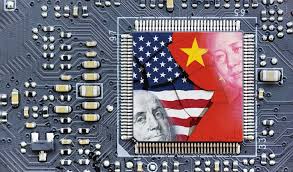
In a dramatic ratcheting up of trade tensions, China announced an immediate ban on the export of the minerals gallium, germanium, and antimony to the United States. The announcement comes just one day after Washington imposed new restrictions targeting China’s semiconductor industry.
The Ministry of Commerce directive cited national security concerns over dual-use items with both military and civilian applications. It also ordered stricter review over the end-use of graphite items shipped to the U.S. “In principle, the export of gallium, germanium, antimony, and superhard materials to the United States shall not be permitted,” said the commerce ministry.
The move solidifies the existing restrictions on exports of critical minerals that China started implementing last year, particularly targeted at the U.S. market. Indeed, according to the data from Chinese customs, there have been no exports of wrought or unwrought germanium or gallium to the U.S. from January to October this year, though both were the fourth and fifth-largest markets for China last year.
Gallium and germanium are used in the production of semiconductors, with germanium also being used in infrared technology, fiber optic cables, and solar cells. China’s total shipments of antimony products crashed 97% in October from September after export limits were imposed.
Last year, China accounted for 48% of globally mined antimony, a mineral used in various applications, including ammunition, infrared missiles, and night-vision goggles. This year, China produced 59.2% of refined germanium and an impressive 98.8% of refined gallium, according to consultancy Project Blue.
Jack Bedder, co-founder of Project Blue, said this ban marks a significant ramping up of supply chain pressures, where raw material feedstocks are already scarce in the West. Antimony trioxide prices in Rotterdam leaped 228% from the start of the year to $39,000 per metric tonne by November 28.
Industry analysts expect a flurry of countries to now start looking for domestic antimony deposits due to these sanctions. China’s announcement comes after Washington’s latest crackdown on the semiconductor sector, blacklisting 140 companies including Naura Technology Group, a chip equipment manufacturer.
Peter Arkell, chairman of the Global Mining Association of China, said this retaliatory move is not unexpected as U.S. authorities are putting more limits in place. “It’s a trade war that has no winners,” he said. There have been calls from various Chinese industry groups to members to try as much as possible to procure domestically manufactured semiconductors, with some even asserting that US chips are no longer safe or reliable.



